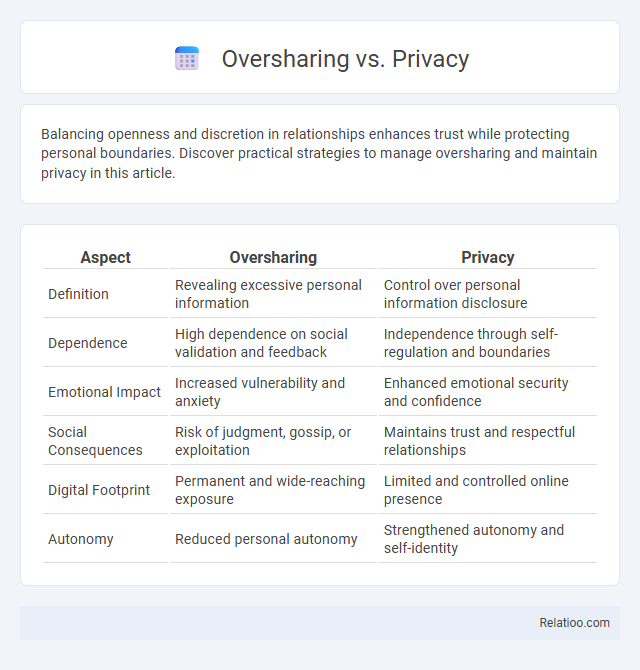Balancing openness and discretion in relationships enhances trust while protecting personal boundaries. Discover practical strategies to manage oversharing and maintain privacy in this article.
Table of Comparison
| Aspect | Oversharing | Privacy |
|---|---|---|
| Definition | Revealing excessive personal information | Control over personal information disclosure |
| Dependence | High dependence on social validation and feedback | Independence through self-regulation and boundaries |
| Emotional Impact | Increased vulnerability and anxiety | Enhanced emotional security and confidence |
| Social Consequences | Risk of judgment, gossip, or exploitation | Maintains trust and respectful relationships |
| Digital Footprint | Permanent and wide-reaching exposure | Limited and controlled online presence |
| Autonomy | Reduced personal autonomy | Strengthened autonomy and self-identity |
Understanding Oversharing in the Digital Age
Understanding oversharing in the digital age involves recognizing the fine line between sharing personal information and maintaining privacy online. Oversharing can expose individuals to risks such as identity theft, cyberbullying, and loss of professional opportunities, highlighting the importance of digital boundaries. Protecting privacy requires careful consideration of what is shared on social media platforms and awareness of potential long-term consequences.
The Importance of Privacy in Online Spaces
Maintaining privacy in online spaces is essential for protecting personal information from misuse, identity theft, and cyberbullying. Oversharing sensitive details on social media platforms can lead to security risks and unintended consequences that compromise one's digital footprint. Emphasizing privacy safeguards helps users control their data, fostering safer and more trustworthy online environments.
Psychological Motivations Behind Oversharing
Psychological motivations behind oversharing often stem from a need for validation, emotional release, and connection, driven by underlying feelings of loneliness or low self-esteem. Individuals may use social media or conversations to fulfill these needs, seeking affirmation and empathy from others while inadvertently compromising their privacy. Understanding the balance between expressing oneself and maintaining boundaries is key to protecting mental well-being and personal information.
Risks and Consequences of Publicly Sharing Personal Information
Sharing personal information publicly can expose you to identity theft, cyberstalking, and financial fraud, significantly compromising your digital security. Oversharing on social media platforms often leads to unintended consequences such as professional damage, privacy invasion, and mental health issues. Protecting your privacy by controlling what you share online minimizes these risks and preserves your personal and professional reputation.
How Social Media Platforms Influence Sharing Habits
Social media platforms shape sharing habits by designing algorithms that reward frequent posting and engagement, encouraging users to overshare personal information for social validation. Privacy settings and platform policies often lack clarity, leading users to unknowingly expose sensitive data while trying to maintain their social presence. The balance between oversharing and protecting privacy is continually challenged as platforms prioritize content visibility over user data security.
Recognizing the Boundaries: What Should Remain Private?
Recognizing the boundaries between oversharing and maintaining privacy is essential for protecting your personal information and emotional well-being. Sensitive data such as financial details, intimate relationship issues, and personal health matters should remain private to avoid misuse or judgment. Your discretion in sharing only necessary information fosters trust and safeguards your digital and social presence effectively.
Oversharing vs Privacy: Finding a Healthy Balance
Striking a healthy balance between oversharing and privacy is essential to protect your digital footprint and personal boundaries. Oversharing can expose sensitive information to unintended audiences, increasing risks such as identity theft or social backlash. Prioritizing privacy empowers you to control what personal details are shared, ensuring safety and fostering trust in both online and offline interactions.
Privacy Protection Strategies for Digital Users
Privacy protection strategies for digital users include employing strong, unique passwords combined with multi-factor authentication to safeguard accounts from unauthorized access. Utilizing encryption tools for messages and data, alongside regular software updates, minimizes vulnerabilities against cyber threats. Limiting personal information shared online and adjusting social media privacy settings effectively curb oversharing risks while maintaining control over digital footprints.
Impact of Oversharing on Relationships and Reputation
Oversharing personal information on social media or in everyday conversations can severely damage Your relationships by eroding trust and fostering misunderstandings. Privacy serves as a critical boundary that protects intimate details from becoming public knowledge, helping to maintain respect and emotional security. Persistent oversharing risks tarnishing Your reputation, leading to social judgment and potential professional consequences in both personal and work environments.
Building a Privacy-First Digital Mindset
Building a privacy-first digital mindset involves recognizing the fine line between oversharing and protecting personal information in online environments. Emphasizing data minimization, users should critically evaluate the necessity of every piece of shared content to prevent unintended privacy risks. Prioritizing secure communication tools and privacy settings fosters greater control over digital footprints, reducing vulnerability to data breaches and identity theft.

Infographic: Oversharing vs Privacy
 relatioo.com
relatioo.com